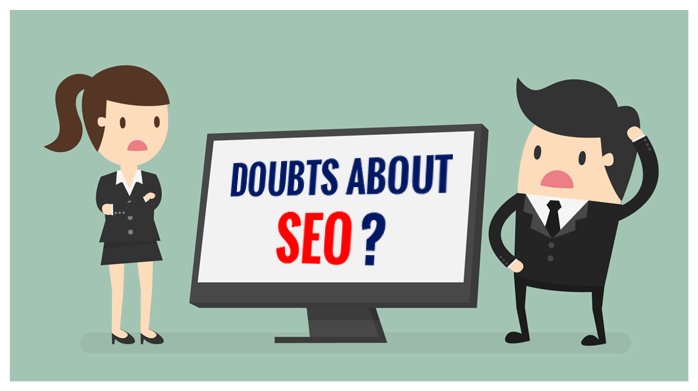This article aims to address the major doubts surrounding SEO, offering clarity through expert insights and data-driven perspectives.
1. Is SEO Still Worth the Investment in 2024?
Despite the rise of paid advertising, social media marketing, and new digital platforms, SEO remains an indispensable strategy. Organic search is still the dominant driver of web traffic, with studies showing that more than 53% of all trackable website traffic comes from organic search.
The primary reason SEO holds such value is that it targets users who are actively searching for products, services, or information. Unlike paid media, which interrupts a user’s experience, SEO captures intent-driven traffic, making it inherently more effective at conversion.
Moreover, SEO delivers a much higher ROI compared to other channels when executed correctly. While it may require an upfront investment in time and resources, the long-term benefits in organic traffic acquisition make it an essential part of any sustainable digital marketing strategy.
2. How Important Are Backlinks in Modern SEO?
Backlinks have been a cornerstone of SEO for over a decade, but their role has evolved. In 2024, backlinks remain one of the top-ranking factors for Google, but the emphasis has shifted from sheer quantity to quality and relevance.
The major doubt often arises regarding how to approach link building effectively in a post-Penguin world, where spammy or irrelevant links can harm rankings. The key lies in earning backlinks from authoritative, industry-relevant websites rather than pursuing quantity. Links from trustworthy sources not only enhance domain authority but also send strong signals to Google about the relevance and value of your content.
However, link-building alone is insufficient. A successful SEO strategy must balance content quality, technical SEO, and user experience alongside backlink acquisition.
3. Can AI and Automation Replace SEO Experts?
The rise of AI-driven content generation tools like GPT-3 has led to the misconception that automation might replace SEO professionals. While AI is reshaping content production and keyword research, human expertise remains irreplaceable in certain critical aspects of SEO.
Search engine algorithms, particularly Google’s, are built to prioritize user intent and experience. Understanding the nuances of user behavior, industry trends, and competitive landscapes requires strategic thinking, creativity, and adaptability—skills that AI cannot fully replicate.
Automation tools can certainly streamline aspects of SEO, such as site audits, keyword analysis, and content optimization. But the human element is crucial for crafting a content strategy, developing link-building campaigns, and understanding how to optimize for evolving search intent.
In short, AI enhances SEO processes but does not eliminate the need for skilled professionals who can navigate the complexities of search engine behavior and user engagement.
4. Is Content Quality Really the Most Important Ranking Factor?
“Content is king” has long been a mantra in SEO, but this has led to confusion about what defines “quality content.” Many marketers assume that publishing long-form articles stuffed with keywords is sufficient, but Google’s algorithm has become more sophisticated in evaluating content based on relevance, authority, and value.
Quality content in SEO terms means:
- Meeting user intent: Does the content answer the user’s query or solve their problem?
- Expertise and credibility: Is the content written by or linked to authoritative sources? This plays into Google’s EEAT framework (Experience, Expertise, Authoritativeness, Trustworthiness).
- Engagement metrics: Google tracks how users interact with your content—bounce rate, time on page, and click-through rates (CTR) all influence rankings.
- Freshness and accuracy: Regularly updated, factually correct content performs better, particularly in industries where information rapidly changes (e.g., finance, health).
Thus, while content quality remains one of the most critical ranking factors, it must be part of a broader SEO strategy that includes technical optimization, strong internal linking, and user-focused experiences.
5. How Important is Technical SEO in 2024?
While content and backlinks often dominate the SEO conversation, technical SEO has grown increasingly important. Google’s search algorithms now focus heavily on factors like website speed, mobile-friendliness, and Core Web Vitals, which all directly impact user experience.
Key areas of technical SEO that should be addressed include:
- Page load speed: Google has explicitly stated that slow-loading sites will be penalized in rankings.
- Mobile optimization: With mobile-first indexing, websites that are not mobile-friendly will see reduced visibility.
- Core Web Vitals: Metrics like Largest Contentful Paint (LCP), First Input Delay (FID), and Cumulative Layout Shift (CLS) measure the quality of user interaction with your site. Poor scores in these areas can drastically impact rankings.
- Indexability and crawlability: Ensuring that your site is free from indexing errors, has clean sitemaps, and well-structured internal linking is critical for allowing Google to properly crawl and rank your content.
Investing in technical SEO lays the foundation for higher rankings, as even the best content won’t rank if Google cannot efficiently access, index, and understand your site.
6. Is SEO Impacted by Voice Search and Zero-Click Results?
The increasing adoption of voice search and zero-click results represents a significant shift in search behavior, leaving many SEO professionals wondering how to adjust strategies.
Voice search tends to prioritize short, concise answers, which means content must be optimized for featured snippets and structured data. Ensuring that your website has schema markup and addresses common voice queries can increase the likelihood of being featured in voice search results.
Similarly, the rise of zero-click searches (where the user gets the answer directly from the search engine result page) challenges traditional click-through rate optimization. While it reduces organic CTR, being featured in these positions still drives brand visibility and can reinforce authority, especially for local SEO or informational queries.
7. How Long Does SEO Take to Show Results?
One of the biggest misconceptions surrounding SEO is how quickly results can be achieved. Unlike paid advertising, SEO is a long-term investment, and it typically takes several months to start seeing significant improvements in organic rankings and traffic.
Factors influencing the timeline include:
- Competition level: High-competition industries take longer to rank.
- Domain authority: New websites will take longer to establish authority than established ones.
- Consistency and quality of efforts: Regular content updates, continuous technical optimizations, and effective link building accelerate results.
In general, most SEO strategies start to show measurable impact within 4-6 months, with the best results often taking 12 months or more. Patience and persistence are key to reaping the long-term rewards of SEO.
Conclusion
SEO is a complex, ever-evolving discipline, and the doubts surrounding it are often fueled by its constantly changing nature. However, by staying informed about current trends, prioritizing content quality and technical optimization, and leveraging both automation and human expertise, businesses can achieve sustained success in search rankings.
Ultimately, SEO remains one of the most powerful tools for driving organic traffic and growing a business’s digital footprint—provided the strategy is executed with patience, precision, and a forward-thinking approach.


